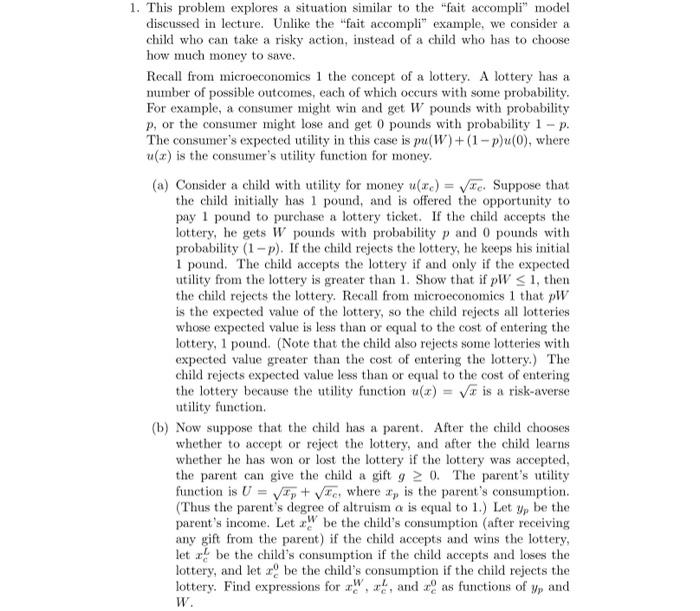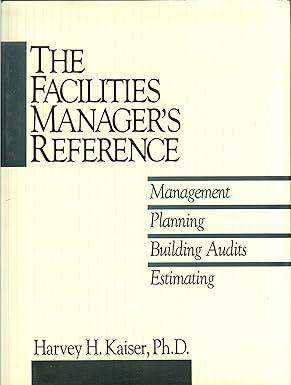discussed in lecture. Unlike the "fait accompli" example, we consider a child who can take a risky action, instead of a child who has to choose how much money to save. Recall from microeconomics 1 the concept of a lottery. A lottery has a number of possible outcomes, each of which occurs with some probability. For example, a consumer might win and get W pounds with probability p, or the consumer might lose and get 0 pounds with probability 1p. The consumer's expected utility in this case is pu(W)+(1p)u(0), where u(x) is the consumer's utility function for money. (a) Consider a child with utility for money u(xc)=xe. Suppose that the child initially has 1 pound, and is offered the opportunity to pay 1 pound to purchase a lottery ticket. If the child accepts the lottery, he gets W pounds with probability p and 0 pounds with probability (1p). If the child rejects the lottery, he keeps his initial 1 pound. The child accepts the lottery if and only if the expected utility from the lottery is greater than 1 . Show that if pW1, then the child rejects the lottery. Recall from microeconomics 1 that pW is the expected value of the lottery, so the child rejects all lotteries whose expected value is less than or equal to the cost of entering the lottery, 1 pound. (Note that the child also rejects some lotteries with expected value greater than the cost of entering the lottery.) The child rejects expected value less than or equal to the cost of entering the lottery because the utility function u(x)=x is a risk-averse utility function. (b) Now suppose that the child has a parent. After the child chooses whether to accept or reject the lottery, and after the child learns whether he has won or lost the lottery if the lottery was accepted, the parent can give the child a gift g0. The parent's utility function is U=xp+xc, where xp is the parent's consumption. (Thus the parent's degree of altruism is equal to 1.) Let yp be the parent's income. Let xcW be the child's consumption (after receiving any gift from the parent) if the child accepts and wins the lottery, let xcL be the child's consumption if the child accepts and loses the lottery, and let xc0 be the child's consumption if the child rejects the discussed in lecture. Unlike the "fait accompli" example, we consider a child who can take a risky action, instead of a child who has to choose how much money to save. Recall from microeconomics 1 the concept of a lottery. A lottery has a number of possible outcomes, each of which occurs with some probability. For example, a consumer might win and get W pounds with probability p, or the consumer might lose and get 0 pounds with probability 1p. The consumer's expected utility in this case is pu(W)+(1p)u(0), where u(x) is the consumer's utility function for money. (a) Consider a child with utility for money u(xc)=xe. Suppose that the child initially has 1 pound, and is offered the opportunity to pay 1 pound to purchase a lottery ticket. If the child accepts the lottery, he gets W pounds with probability p and 0 pounds with probability (1p). If the child rejects the lottery, he keeps his initial 1 pound. The child accepts the lottery if and only if the expected utility from the lottery is greater than 1 . Show that if pW1, then the child rejects the lottery. Recall from microeconomics 1 that pW is the expected value of the lottery, so the child rejects all lotteries whose expected value is less than or equal to the cost of entering the lottery, 1 pound. (Note that the child also rejects some lotteries with expected value greater than the cost of entering the lottery.) The child rejects expected value less than or equal to the cost of entering the lottery because the utility function u(x)=x is a risk-averse utility function. (b) Now suppose that the child has a parent. After the child chooses whether to accept or reject the lottery, and after the child learns whether he has won or lost the lottery if the lottery was accepted, the parent can give the child a gift g0. The parent's utility function is U=xp+xc, where xp is the parent's consumption. (Thus the parent's degree of altruism is equal to 1.) Let yp be the parent's income. Let xcW be the child's consumption (after receiving any gift from the parent) if the child accepts and wins the lottery, let xcL be the child's consumption if the child accepts and loses the lottery, and let xc0 be the child's consumption if the child rejects the







